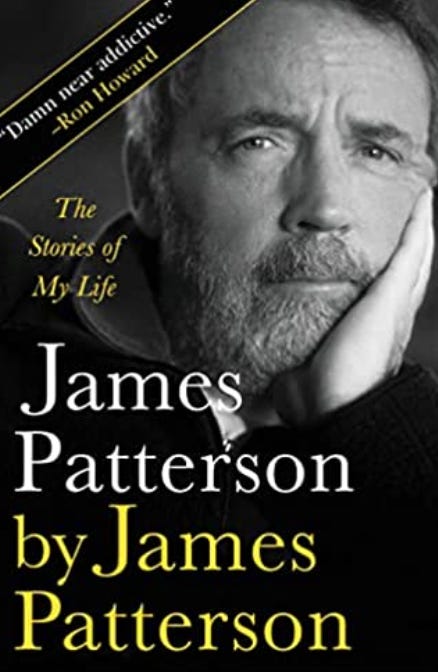Hello, Adversity Weekly Roundup #16 - May 20, 2023
A new film on the life of Michael J. Fox, counteracting the loneliness of remote work, when you should give up on your dreams, and a review of James Patterson's memoir

Hi everyone!
Welcome to the 16th edition of the Hello, Adversity Weekly Roundup. I hope you had a great week.
The weather here in the Northeastern U.S. has been quite pleasant the last few days. Spring has officially sprung. The woods in our backyard have gone from dreary and leafless to verdant almost overnight. (The pollen is also out in full force, but that is a small price to pay.) The rabbits have returned. Birds are nesting. Chipmunks are learning the layout of our garden so they can attack our tomato plants later this summer. There’s even a family of turkeys that cut across our lawn every few days to peck at the scattered birdseed next door.
When I find myself stressed out, I like to fix my gaze on the beauty outside. Right now, there’s a cardinal perched on a tree branch set against the greenest backdrop I have ever seen. My mind tends to go haywire sometimes, and these short moments of blissful observation can help to restore balance to my day.
I must admit—I need to get better at taking these small, strategic breaks throughout the day. Hopefully, you have your own “escape”, whether it’s looking out your window, going for a walk, or reading a book.
What are some of your favorite daily escapes? Let me know in the comments.
Now, on to the links:
A new film about the life of actor Michael J. Fox is now airing on Apple TV+. The film—which is part documentary, part scripted movie—tells the story of Fox’s early years and rise in Hollywood, before focusing on his life with Parkinson’s Disease.
Here’s the trailer:
Fox was adamant that if he was going to participate in this project, he didn’t want to be portrayed as inspirational or as someone to be pitied. “Yeah, that’s boring,” he says in the trailer. He expands on this point in the article:
“You see, sometimes in movies and television, someone with a disability is struggling to perform some normal task like tying their shoelaces or something. And as they struggle and as they get the bunny ears through the hole, the music starts to swell and it's this violin concerto and builds up until the moment of success, and they've got a tied up shoelace, and music is soaring. And I don't like that.”
I completely understand where he’s coming from. On one hand, he is the visible face of a debilitating disease. But on the other hand, he doesn’t want to be inspirational just because he continues to live his life.
Fox exudes what I would call pragmatic optimism. He is positive, but he has no illusions about what he is up against. He is the first to admit that life doesn’t come easy, especially as his condition progresses. He falls constantly and has broken many bones in the last few years. But he is undeterred. He channels his energy into his philanthropic efforts to find a cure for Parkinson’s Disease, which gives him a sense of purpose.
Above all, he appreciates the little joys in life, which is a wonderful perspective to have. Life may be difficult, but there are always moments of levity and beauty if you know where to look.
Loneliness has been in the news a lot recently. A couple weeks ago, the U.S. Surgeon General declared a “loneliness epidemic,” which garnered significant news coverage.
The bonds of social connection in our society have been fraying for many years; the pandemic only exacerbated this trend. Excessive isolation can lead to all sorts of negative health consequences, both individual and communal. This is what the Surgeon General wanted to highlight.
One of the reasons we are so lonely nowadays is because of remote work. That’s not to say that remote work doesn’t have benefits—increased flexibility, a shorter commute, getting to wear sweatpants all day—but on the whole, it has removed a great deal of socialization from our daily lives, everything from small talk in line at the coffee shop to lunch with our coworkers in the cafeteria.
When the author of this article, Octavia Goredema, began working remotely, she was excited for the change. However, her excitement soon turned into trepidation:
“I was able to laser-focus on my work, but my interactions with others were driven solely by virtual meeting agendas or email. I noticed I was becoming less enthused and more withdrawn. I spent too much time scrolling social media because I was silently craving connection with others. I was slowly but steadily becoming isolated.”
Goredema then goes on to provide a checklist to explore how remote work makes us feel lonely and offers remedies for building connection into our day.
Most social interactions at work are either scheduled calls or instant messaging. Neither replace face-to-face, non-work conversations. Having some time to talk with friends or coworkers about anything other than work—even if it’s on a video screen—can boost our sense of community, and ultimately, reduce loneliness.
I must admit that this article title got my attention when it landed in my inbox. Going in, I was expecting a diatribe against dreaming of an optimstic future. However, the article’s premise was actually quite reasonable.
To summarize, unfulfilled dreams can be our own worst enemy, and when they become a burden on our lives, we should consider abandoning them.
Pursuing your dream is fine, but only up to a point:
“Dreams can calcify, turning into ghosts of their most useful selves. Instead of inspiring us to take action, they become a source of pain and stagnation. At our worst, we can become so attached to our dreams that we fail to recognize when it's time to let go and move on.”
Many people are so consumed by a dream that it becomes their identity. What might have started out as a noble pursuit becomes a perpetual feeling of dread. What if I don’t succeed? Then what? Should we encounter repeated failures or headwinds, we double down on our efforts rather than assess whether or not our dream is still worth pursuing. (A classic case of the sunk cost fallacy.) This in turn can lead to more stress, increased anxiety, and a decline in productive output.
The solution to this predicament? Declare dream bankruptcy.
Similar to how financial bankruptcy can reset our finances, dream bankruptcy is an admission that our dream is no longer viable, either because it is an outright failure or because the fear of rejection is preventing us from putting our work out there into the world. Neither outcome is good.
The article offers a three-step prescription for how to declare dream bankruptcy. The process will be painful at first, but can provide an opportunity to press the reset button and achieve a healthier balance in life.
Book finished: James Patterson, by James Patterson
My mom recommended James Patterson’s memoir to me once she began reading it and saw that he described his writing process. I’ll be honest—I have never read any of his books. However, I am always interested in learning about how other writers write, especially novelists.
What is his process? He writes a fifty-to-eighty page outline of every book, before writing it out in full. He doesn’t type anything out; he hates computers. No, he writes the whole book, outline and all, in pencil.
The memoir is structured as a series of short stories about his life, from growing up in Newburgh, New York, to his time at a major New York ad agency, to life as a successful crime writer. Because each chapter is two pages or less, it moves at a breezy clip, and is full of enough stories and celebrity cameos to make it worth checking out.
The story that interested me the most was hearing about how he struggled to get his first novel—The Thomas Berryman Number—published. It took 31 rejections before a publisher accepted the manuscript.
It’s encouraging to know that even one of the most famous authors in the world was at one time an unknown, aspiring writer. That should give all creators hope!
If you have a story you’d like me to include in a future newsletter, please email me at HelloAdversity@substack.com or leave a comment below.
Follow Hello, Adversity on Instagram!




Such an interesting post, Chris - thank you for these resources and recommendations!
You've asked 'What are some of your favourite daily escapes?' Like you I love to watch nature - I'm envious of your cardinals, chipmunks and wild turkeys because over on this side of the pond they seem so different - I love the blackbirds, goldfinches and squirrels. Writing is a fabulous escape, too. But if I really want to zone out I hit my favourite room in the house - the kitchen - and find stuff to chop, to dice, to whisk or to stir. Cooking is perhaps my favourite thing to do to steady my busy head.
Thanks so much for this, Christopher. I'm writing a piece on what I call malignant optimism and appreciate the article on "goal fusion", which sort of sounds like something on a soccer field, no? LOL. (I'll link to you/this post when my piece is up...in July.) xo